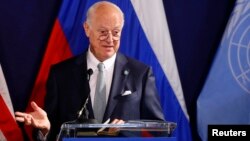The Syrian government’s negotiator says he believes Saturday’s deadly attack in Homs was meant to disrupt peace talks under way in Geneva.
“The terrorist explosions that hit Homs city are a message to Geneva from sponsors of terrorism, and we tell everyone that the message is received and this crime won’t pass unnoticed,” Bashar al-Ja’afari said.
Ja’afari met Saturday with U.N. envoy to Syria Staffan de Mistura in Geneva. De Mistura told reporters before the meeting he hopes the attacks will not affect the peace process, calling them spoilers to peace.
“Every time we are having talks or negotiations there is always someone who tries to spoil. We were expecting that,” he said.
Following the meeting, Ja’afari demanded that opposition group negotiators denounce the attacks as a testament to their commitment to the peace process.
“Any party who refuses to condemn these attacks today we will consider that party to be an accomplice of terrorism,” he said.
For its part, the opposition vowed to continue with the talks, but accused the government of trying to sabotage them by making demands on the opposition.
Some opposition delegates condemned terrorism in general but also hinted that Saturday’s attacks in Homs may have been the work of government forces.
Homs, al-Bab attacks
Twin suicide attacks Saturday in the western city of Homs killed at least 42 people, including a senior intelligence officer.
The city has been under full government control for nearly three years.
One day earlier in northern Syria, two suicide car bombings killed at least 65 people, including many civilians, rebel fighters and at least two Turkish soldiers.
The attacks near al-Bab came one day after Turkish forces and their rebel allies took much of the strategic town from Islamic State (IS) fighters.
With al-Bab under Turkish control, questions are being raised as to what the next move for Turkish forces would be.
Turkish officials have said their next objective after al-Bab is to go after IS in their de facto capital of Raqqa. Ankara has also said that it wants to dislodge the Kurdish fighters from the town of Manbij.
Those moves may face opposition in Washington, analysts say.
Joint strategy
Washington and Ankara have held discussions in the past week over a joint strategy to fight IS, American and Turkish officials said.
“On the issue of fighting (Islamic State), we -- that is Turkey and Saudi Arabia -- will be cooperating with the United States,” Turkish Foreign Minister Mevlut Cavusoglu said last week. “We believe that the fight from now on will be more effective and that we will be able to clear both Syria and Iraq” of IS.
U.S.-backed Syrian Democratic Forces (SDF), a Kurdish-led coalition, has made significant advances on IS near Raqqa, seizing tens of towns and villages in the northern and western parts of the province.
The SDF has also cut off a supply line that connects Raqqa to Deir Ezzor, another IS stronghold in eastern Syria.
The Kurdish YPG is the backbone of the SDF. But Turkey views it as a terror group and has vowed to combat them in parts of northern Syria.
Kurdish military officials, however, say that Turkish military is incapable of leading the offensive toward Raqqa.
“It took Turkey and its allies more than two months to reach al-Bab,” said Nasir Hajj Mansur, a Kurdish commander with the SDF. “So Raqqa is going to be even harder for them if they decided to head there.”






